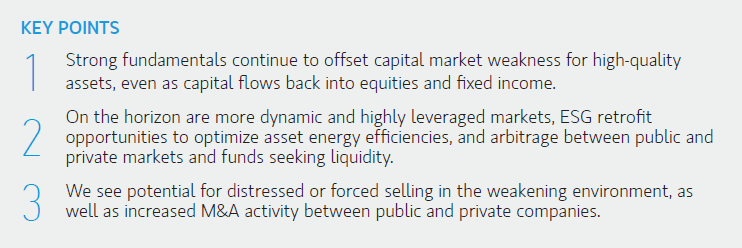Strong Fundamentals Offset Capital Market Weakness for High-Quality Assets

What We Are Seeing
Real estate fundamentals generally remain strong and are helping to offset capital market weakness for high-quality assets. New construction on projects that haven’t begun has stalled, bolstering fundamentals over the intermediate term. Meanwhile, embedded rental income growth should help to protect values amid a weaker macro backdrop. Industrial and residential fundamentals are leading, buoyed by record-low vacancy and secular tailwinds such as eCommerce and high rentership.
Investors are increasing allocations to niche sectors, such as student and senior housing, healthcare and self-storage, which have counter-cyclical demand drivers. Hotel recovery is accelerating for leisure and lagging for corporate. Hybrid office working models and more discerning occupiers are disrupting office demand. Inflationary headwinds continue to challenge retail real estate.
ESG is growing in importance for investors, occupiers and employees, and is critical to optimize rent and asset value.
Real estate transaction markets have stalled due to lower availability and elevated cost of debt, as well as heightened market uncertainty. Japan remains the exception, where financing costs remain at record low levels. Fund flows into real estate have slowed due to the denominator effect, which is shifting capital back into equities and fixed income as investors rebalance portfolios.
What We Are Doing
Increased volatility and the pullback in market liquidity provide a more favorable environment for investors who have capital to acquire high-quality assets in preferred sectors with robust fundamentals, at a reduced basis.
We are targeting more dynamic and highly leveraged markets where re-pricing is expected to be fastest due to higher debt costs (U.S., UK, Australia, South Korea), and we continue to use existing relationships to acquire assets at an attractive basis in Japan. We’re also considering credit opportunities, including gap financing through mezzanine/preferred equity positions.
We are taking advantage of the arbitrage between public and private markets and funds in need of liquidity. We are seeking the highest quality assets that meet post-COVID-19 occupier requirements. We are looking to leverage asset management expertise to drive income growth. Moreover, we are targeting ESG retrofit opportunities to optimize asset energy efficiencies.
What We Are Watching
We are observing how economic, employment, inflation and interest rate signals may inform cyclical market turning points. We are on the lookout for signs of distress or forced selling in the weakening environment.
We are anticipating increased M&A activity between public and private companies.
We see potential for heightened regulatory risks — such as rent control and real estate taxes — from the shifting global political environment. We have our eyes on global dislocation, divergent recovery cycles and different opportunities by region and market. U.S./China geopolitical tensions and the impact on global growth and supply chains continue to add pressure across equities, and we are waiting to see how that impacts private real estate.
Tony Charles
Global Head of Research and Strategy
Morgan Stanley Real Estate Investing
Risk Considerations: Historical performance information is not indicative of future results. Alternative investments are speculative and include a high degree of risk. Investors could lose all, or a substantial amount, of their investment. Alternative instruments are suitable only for long-term investors willing to forgo liquidity and put capital at risk for an indefinite period of time. Alternative investments are typically highly illiquid — there is no secondary market for private funds, and there may be restrictions on redemptions or the assignment or other transfer of investments in private funds. Alternative investments often utilize leverage and other speculative practices that may increase volatility and risk of loss. Financial intermediaries are required to satisfy themselves that the information in this document is suitable for any person to whom they provide this document in view of that person’s circumstances and purpose. Morgan Stanley Investment Management (MSIM), its affiliates and its and their respective directors, officers, members, partners, employees, agents, advisors, representatives, heirs and successors shall have no liability whatsoever with respect to any person’s or entity’s receipt, use of or reliance upon this document or any information contained herein. If such a person considers an investment, she/he should always ensure that she/he has satisfied herself/himself that she/he has been properly advised by that financial intermediary about the suitability of an investment.

